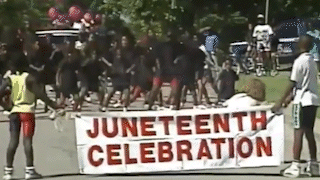"Free-ish"
It’s Juneteenth. Which means it’s a great day to review your subscription preferences and upgrade to support this Black writer. If you are working for a company that has formally observed Juneteenth, and given you the day off, then chances are you definitelyyyy can can.
“They turned us out just like, you know, you turn out cattle, I'd say.”
Laura Smalley was an enslaved child boarded as livestock alongside other slaves on a plantation in Hempstead, Texas. One of the plantation’s many masters, “Mr. Albert,” had been away fighting for the Confederacy for so long that many of the enslaved thought he had died. He didn’t. He returned back to Hempstead at the end of the Civil War, where he and the plantation resumed their business, uninterrupted, for nearly another year.
On June 19, 1866, Laura and the others were finally set “free” — left to wander off plantation grounds and into open land with no transitional care, housing, reparative measures, funding, or protection. A gift from the country that had desperately propagandized their humanity and their deserving of freedom into its exhausted war strategy.
The 1941 interview where she discusses her life with John Henry Faulk is available as a five (5) part audio series via the Library of Congress website.
Her interview includes accounts of the abuse and torture of enslaved people, including elderly enslaved women, as well as the prevalent kidnapping of freed Black American adults and children that followed in the months and years after the Juneteenth “liberation.” Laura’s own grandchild, her daughter’s only child, being one of those snatched and disappeared into forced servitude.
The more adopted Juneteenth™ becomes in American culture and media, the more it’s origin will be rinsed and sanitized into a more comfortable story.
Laura Smalley Interview:
Audio: Part 1 | Part 2 | Part 3 | Part 4 | Part 5
Full Transcription: Here





